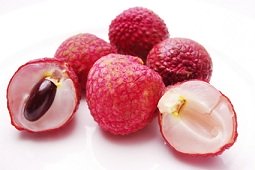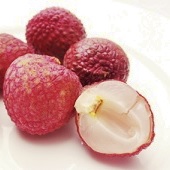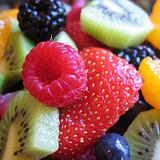Lychees Nutrition Facts,
Health Benefits of Lychees
All about lychees nutrition information, calories in lychees, nutritional benefits of lychee fruit, lychees and weight loss
The lychee, or litchi, originates from Asia. It’s a small round fruit covered in a rose colored rough inedible skin. Peel away the skin and you’ll find a creamy, juicy, translucent, perfumed fruit. The fruit is best fresh, otherwise the perfumed smell normally disappears when they are canned. Throw away the stone, unless of course you want to start growing your own lychees.
Lychees are very low in calories, just 66 calories per serving (100g or 3.5oz). They contain almost no fat and no cholesterol, so lychees are a perfect fruit for your weight loss plan and ideal as a snack.
Lychees are full of antioxidants and packed with vitamin C, one serving provides more than the recommended daily intake (RDI). Along with other vitamins and minerals, lychees contain modest amounts of copper.
Polyphenols are natural water soluble compounds, and the lychee is full of them. Research has found that lychees may help to fight the fat cells, therefore reducing obesity. If breaking down fat cells isn’t enough, the fruit is believed to act as an anti-inflammatory and may lower our cholesterol.
The fruit damages easily, so eat as quickly as possible once you have purchased them.
Compare lychees nutrition facts to the other fruits.

Nutritional Value of Lychee Fruit
| Lychees nutritional value per 100 g (3.5 oz) Refuse: 40% (Shell and seeds) Scientific Name: Litchi chinensis Common Name: lychee |
|
|---|---|
| Proximates: | |
| Water | 81.76 g |
| Energy | 276 kJ (66 kcal) |
| Protein | 0.83 g |
| Carbohydrates | 16.53 g |
| Total Fat: | 0.44 g |
| Fiber | 1.3 g |
| Cholesterol | 0 mg |
| Minerals: | |
| Calcium, Ca | 5 mg (0.5 %) |
| Iron, Fe | 0.31 mg (2 %) |
| Magnesium, Mg | 10 mg (3 %) |
| Phosphorus, P | 31 mg (3 %) |
| Potassium, K | 171 mg (4 %) |
| Sodium, Na | 1 mg (0.04 %) |
| Zinc, Zn | 0.07 mg (0.5 %) |
| Copper, Cu | 0.148 mg (7 %) |
| Manganese, Mn | 0.055 mg (3 %) |
| Selenium, Se | 0.6 mcg (1 %) |
| Vitamins: | |
| Vitamin C | 71.5 mg (119 %) |
| Thiamine (Vit. B1) | 0.011 mg (0.7 %) |
| Riboflavin (Vit. B2) | 0.065 mg (4 %) |
| Niacin (Vit. B3) | 0.603 mg (3 %) |
| Vitamin B6 | 0.100 mg (5 %) |
| Folate (Vit. B9) | 14 mcg (4 %) |
| Vitamin E | 0.07 mg (0.4 %) |
| Vitamin K | 0.4 mcg (0.5 %) |
| Percentages are relative to US Recommended Daily Intake (RDI) for adults. | |
Author: Lana Soko
You Might Also Like:
Like This Page?
|
Share This Page:
|







